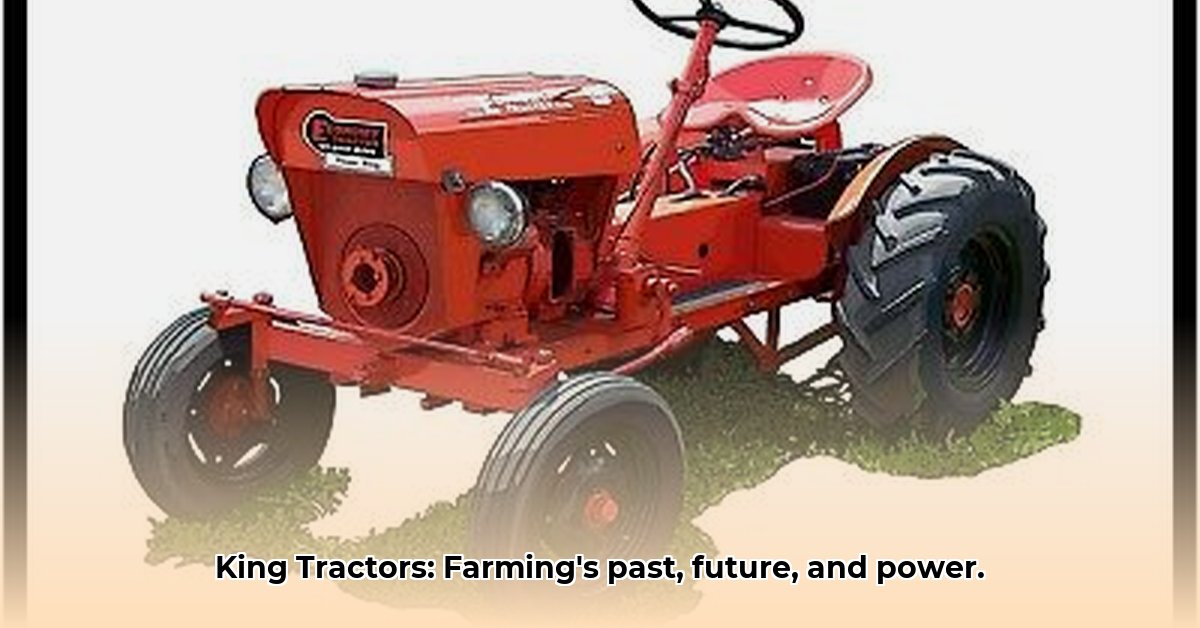
The Economy Power King tractor, a stalwart of mid-20th-century agriculture, provides a compelling case study in the evolution of farming technology and its implications for sustainability. While these robust machines served their purpose admirably in their time, their suitability for modern, sustainable agricultural practices is severely limited. For more information on vintage tractors, see this helpful resource: Old IH Tractors. This article examines the challenges inherent in using vintage tractors like the Power King in contemporary farming, comparing them to current equipment and exploring the significant advancements in sustainable agricultural technologies.
The Economy Power King: A Historical Context
The Economy Power King tractor, characterized by its robust build and reliance on powerful gasoline engines, reflects the agricultural technology of its era. Its manual operation and relatively basic design, while efficient for the time, represent a significant departure from the precision and efficiency demanded by today's sustainable farming practices. Compared to modern tractors, the Power King's fuel efficiency was likely considerably lower, resulting in higher fuel consumption per unit of work. Further, its lack of precision in tasks such as seeding and fertilization could have resulted in resource overuse, thereby impacting overall sustainability. The absence of detailed historical data on fuel consumption and resource usage, however, limits precise quantification of its environmental impact.
The Evolution of Sustainable Agriculture
Agriculture’s trajectory from horse-drawn plows to modern machinery reflects a growing understanding of environmental stewardship. The initial mechanization of farming significantly boosted efficiency, but the current focus is on sustainability, moving beyond mere increases in productivity to embrace environmentally conscious practices. This shift emphasizes minimizing environmental impact while maintaining (or increasing) agricultural output.
Defining Sustainable Agriculture
Assessing the sustainability of agricultural machinery requires a holistic approach, extending from manufacturing to end-of-life disposal. Key metrics include fuel efficiency (fuel consumption per unit of work), greenhouse gas emissions (impact on climate change), and overall resource utilization. Unfortunately, comprehensive data regarding the long-term environmental impact of vintage tractors like the Economy Power King remain scarce, hindering a comprehensive comparison with modern equipment. This lack of historical data highlights the crucial need for better data collection practices across the agricultural sector. This is a significant challenge in conducting a precise cost-benefit analysis comparing equipment from vastly different eras.
Comparing the Economy Power King to Modern Equipment
A direct comparison between the Economy Power King and contemporary tractors reveals a substantial technological gap. Modern tractors boast significantly improved fuel efficiency, frequently incorporating innovations such as electric motors or biofuels. Furthermore, precision farming technologies, enabled by GPS and other advanced sensors, allow for targeted application of inputs like fertilizers and pesticides, markedly reducing waste and optimizing resource use. The difference boils down to a contrast between manual, often imprecise operations and the data-driven, precision-guided systems of modern sustainable agriculture.
Modern Sustainable Agricultural Technologies
The landscape of modern sustainable agriculture showcases remarkable technological progress. Electric tractors, for example, are becoming increasingly prevalent, offering zero tailpipe emissions—a significant improvement over their gasoline-powered predecessors. Precision farming, encompassing GPS-guided planting, variable-rate fertilizer application, and other advanced techniques, optimizes resource allocation and minimizes waste. Even the deployment of drones enhances crop monitoring, allowing for targeted interventions. These advancements underscore a growing commitment to responsible land management and the creation of a truly sustainable future for agriculture.
Conclusion: Research and the Future of Sustainable Agriculture
The limitations encountered in evaluating the Economy Power King's sustainability highlight the importance of ongoing research and data collection. A comprehensive understanding of historical agricultural practices and their environmental impact is vital for informing future innovation. Creating robust databases that meticulously compare historical and contemporary equipment will enhance our ability to assess the environmental implications of technological choices across different eras. This collaborative endeavor necessitates a shared commitment from researchers, farmers, and policymakers to paint a more detailed and data-rich picture of the evolution of agricultural technology and its interplay with environmental sustainability. Only through such cooperative efforts can we build a more sustainable and robust agricultural system that benefits both present and future generations. The shift towards sustainable agriculture isn't just a matter of technological advancement; it's a testament to evolving awareness regarding humanity's responsibility towards the environment.